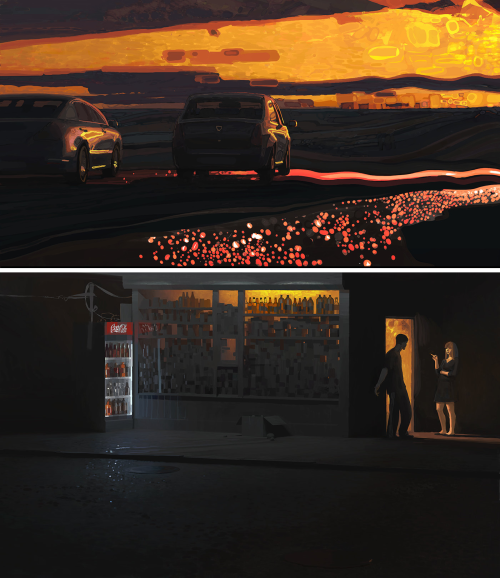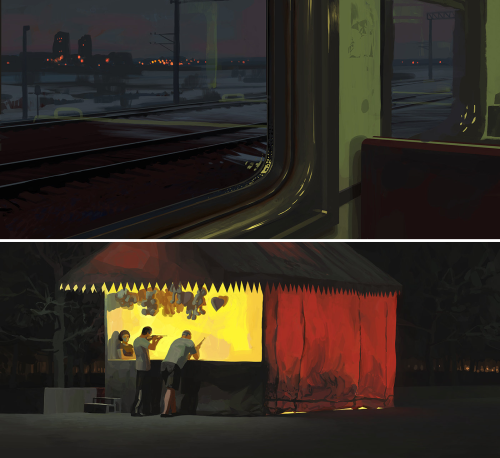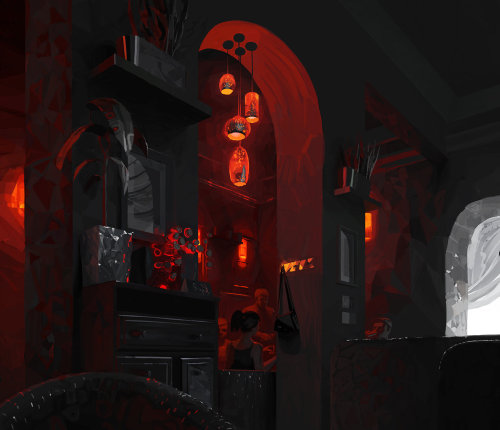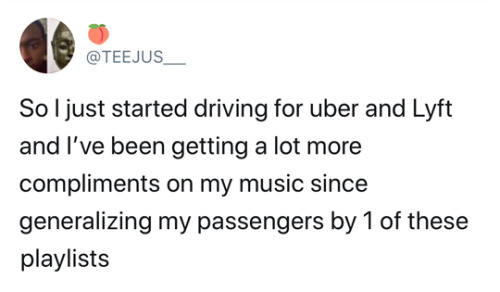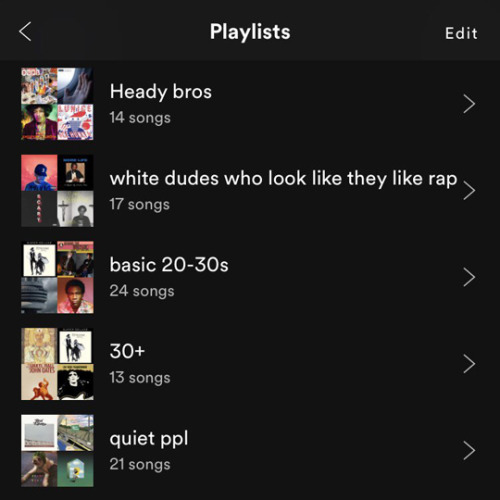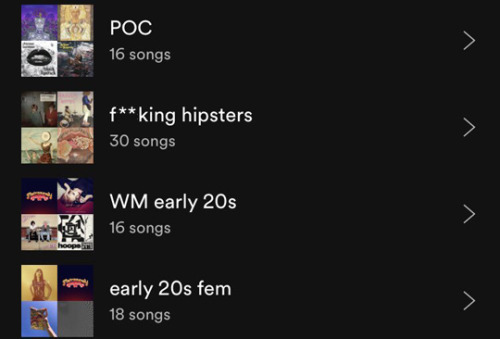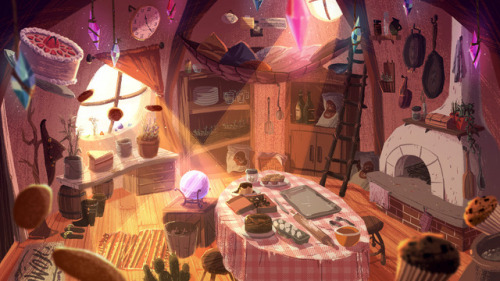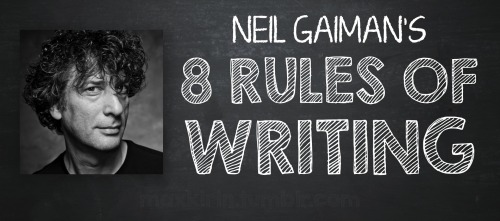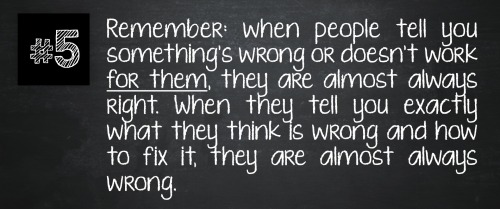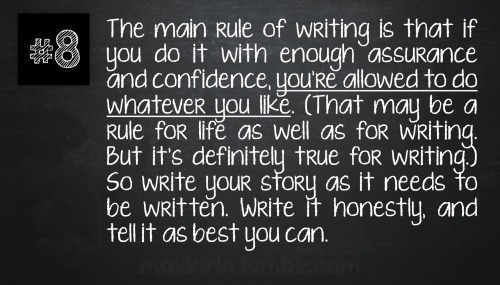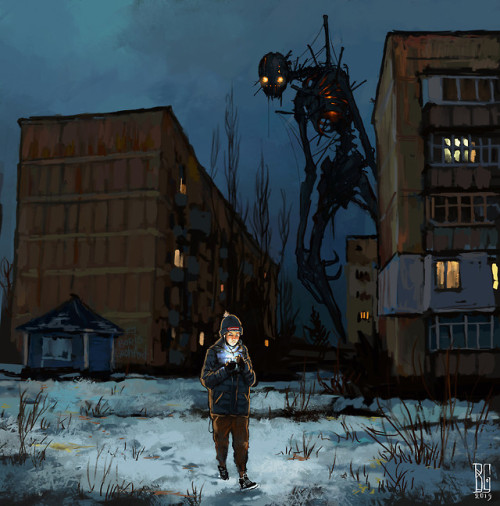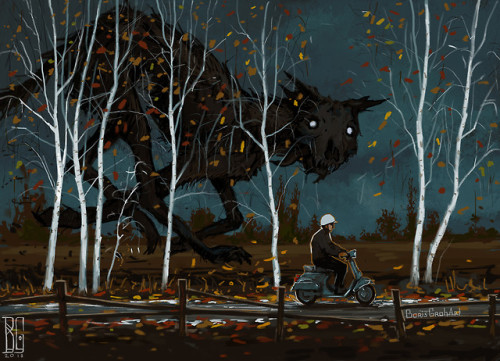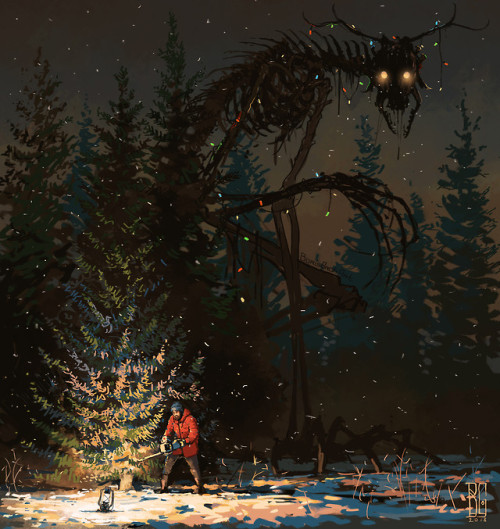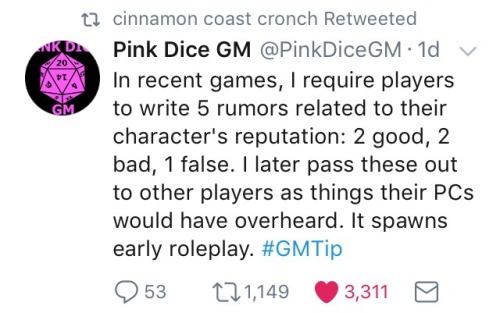things that might inspire me or help with with my writing skills
55 posts
Latest Posts by agent-ishiguro - Page 2
Writing Tip Index
So I realize most of my Tumblr followers just follow me on Tumblr, which I’m cool with, but since I’ve been working really hard on updating my website, I still wanted to share it with everyone. If you have visited it recently, you’ve probably noticed quite a few changes. You can check it out here.
One of the new features is that I’ve compiled an almost complete list of my writing tips by topic. I’ll be updating it regularly here.
Below is the list as of my posting this. There are also a couple of articles that aren’t mine (noted) that I refer other writers to.
Beginning
Coming up with a Good First Sentence
Tips on Starting a Story
How to Start Writing When You Have No Idea Where to Start
Brainstorming
The REAL Key to Brainstorming: Restrictions
Flipping Story Stuff
Stacking Your Brainstorming Ideas
Coming up with a Plot (from scratch)
Breaking Writing Rules
Breaking Writing Rules Right: “Show, don’t Tell”
Breaking Writing Rules Right: “Don’t Use ‘Was’”
Breaking Writing Rules Right: “Don’t Use Adverbs, Adjectives”
Breaking Writing Rules Right: “Only Use ‘Said’”
Characters
Complex Characters and the Power of Contradiction
Making Unlikeable People into Likeable Characters
Character Traits that Hike Up Tension
Creating Stunning Side Characters (and Why They Matter)
Relationship as a Character: Crafting Duos, Trios, Groups that Readers can’t Resist
Pairing Behaviors with Odd Demeanors for Originality
“The Emotional Range of a Teaspoon”: Your Characters’ Spectrum of Emotions
Considering the Irrationality of Your Characters
How to Pick the Right Character Names
The “Twins as Clones” Writing Epidemic
What You Need to Know Most About Character Voice
Conflict
Coming up with a Plot (from scratch)
Are Your Conflicts Significant?
Keeping Conflicts Unresolved
The Oft Forgotten Conflict and How to Make it Work: Man Vs. God
Context
Context vs. Subtext (Context Should Not Become Subtext)
Making Strengths into Weaknesses (and Vice Versa) through Context
Description
Picking the RIGHT Details
Three Tweaks that Keep Details Interesting
Breaking Writing Rules Right: “Don’t Use Adverbs, Adjectives”
Dialogue
Writing Realistic and Complex Dialogue
Kicking “Great” Dialogue up to “Killer” Dialogue
Breaking Writing Rules Right: “Only Use ‘Said’”
Generic Dialogue—Staaaahp
(Don’t) Tell Me How You Really Feel
Emotion
Writing Empathetically vs. Sympathetically and Sentimentally
Let Your Reader do the Work
Raw vs. Subdued Emotions: Getting them Right in Your Story
“The Emotional Range of a Teaspoon”: Your Characters’ Spectrum of Emotions
Gaining Incredible Emotional Power by Crossing Opposites
Choosing Relatable Descriptions to Power up Empathy
Selecting the Right Sentence Structure for the Right Emotion
Dealing with Melodrama: What it is, How it Works, and How to Get Rid of it
The Emotion Thesaurus by Angela Ackerman and Becca Puglisi
Feedback
The Real Reason You NEED to Give Positive Feedback!
Feeding us Criticism
Foils
Playing with Foils
Grammar and Punctuation
Dangling Modifiers and How to Correct Them (Purdue OWL)
Punctuation in Dialogue (The Editor’s Blog)
Humor
15+ Tactics for Writing Humor
Guardians of the Galaxy and the Art of Constructing Jokes (Film Cit Hulk Smash)
Micro-Concepts
Writing Micro-concepts
Mystery
The Mechanics of Rendering Mysteries and Undercurrents—How to Withhold Info Right
Keep reading
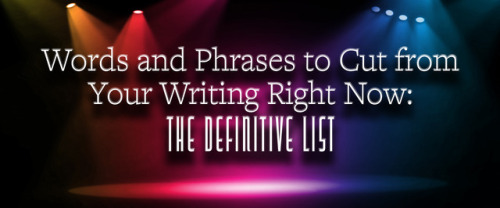
So, so many works I’ve read could be vastly improved with tightening and shaving of superfluous words. Wordiness is an easy stumbling block, as we’re used to how we talk. We’re used to how others (long ago) wrote. But times change, my friend, and so do expectations of the writer. We don’t get paid by the word in fiction. So show your smarts and say as much as you can with as much power as you can in as few words as possible.
Here are a few things you can cut without reserve to help shorten your story right now. And as you catch yourself using these words in your next draft, hit that backspace before you finish the sentence! It’s okay if you already have. You can go delete them now. No one will ever know.

Moment/Second/Minute
It’s so tempting. I am guilty of using this word like fertilizer in my first drafts. But most of the time, these words aren’t needed at all. They add nothing.
He sat down for a moment, sipping his coffee. vs. He sat down and sipped at his coffee.
But he only did it for a moment, you say!
He sat down for a moment, sipping his coffee. When the door opened a second later, he shot to his feet. vs. He sat down and sipped his coffee. The door opened, and before he could swallow his first sip, he shot to his feet.
I know, this is about making your writing more concise and my “right” example has more words than the first example. But what’s the difference? The words used in the second sentence are more tangible. They give a visual that “a second later” and “for a moment” don’t. And you could leave that part out, of course, if you’re really going for trimming word count. It doesn’t paint quite the same image, but “The door opened and he shot to his feet.” is a perfectly good sentence.
Suddenly/All of a sudden
You’ve heard this one, before, surely. These words are used…when? When you’re trying to portray suddenness. Surprise, perhaps. So why are you adding in extra words to slow down the pace?
She flipped on the TV and reclined in her chair. All of sudden, the TV flashed a bright light and the power went out. vs. She flipped on the TV and reclined in her chair. The TV flashed once before the lights went dark. The power was out.
That sense of immediacy is felt when stuff just happens. So let it happen. If it’s rhythm you’re worried about, then find more useful words to create the rhythm. Notice that I didn’t just cut “All of a sudden” out of the sentence and leave it. I reworded it a bit to make it stronger.
Finally
It can be a useful word, but more often than not, it’s just taking up space.
Really/Very
Just…delete them.
To alter a Mark Twain quote:
“Substitute ’[fucking]’ every time you’re inclined to write ‘very;’ your editor will delete it and the writing will be just as it should be.”
But seriously, if you’re saying, “She was breathing very hard.” You could just cut the “very” and say, “She was breathing hard.” Or, even better, “She was panting.” Or, EVEN BETTER: “She panted.”
Himself/herself/myself/themselves
Reflexive nouns have a specific purpose, though they can still often be avoided. They fall into the category of “use only when it’s confusing otherwise.”
Correct: He looked at himself in the mirror. Better: He looked in the mirror.
Incorrect: She gave them to Andrew and myself before leaving. Correct: She gave them to Andrew and me before leaving.
Technically correct I guess: I haven’t eaten lunch myself. (Intensive pronoun; aka waste of words) Better: I haven’t eaten lunch.
Intensive pronouns add emphasis, but that emphasis is negligible and often negated by the power of tightening your narrative.
That
You can likely cut 60% of your “that"s and your story will be unaffected. Sometimes, you do need to add a “that” here and there for clarification, but not always. And sometimes it’s just plain incorrect.
The jacket was the coolest one that he’d ever owned. vs. The jacket was the coolest one he’d ever owned.
In other cases, you might do well to substitute “that” with “which.” Though, if you’re doing this, make sure you do it properly. That change can often alter the meaning of your sentence. That can be for the better, though.
The vandalism that read “Bad Wolf” made Rose nervous. vs. The vandalism, which read “Bad Wolf,” made Rose nervous.
Do you see the difference? In the first sentence, the words are what make Rose nervous. In the second, the vandalism itself makes Rose nervous, and it happens to say “Bad Wolf.” In this case, if you’ve watched Doctor Who, then you know the first example is the correct one.
So when you’re sharing details using “that” or “which,” contemplate how important they are to meaning of the sentence to determine which type of clause you need to use.
Then
Or worse, “And then.”
It makes your writing sound a bit juvenile. Either cut it entirely, or substitute “and.”
She jumped into the pool, then hit her head on the bottom. vs. She jumped into the pool and hit her head on the bottom.
And then, after all that time, she fell asleep. vs. After all that time, she fell asleep.
Even
Sometime “even” can help emphasize a situation or behavior, but when it’s used in narrative improperly, it sounds childish and silly.
He couldn’t even breathe. vs. He couldn’t breathe.
Even with the new hair gel, his hair was terrible. (This one is fine, though you could still cut that “even” if you really wanted to…)
Just
Just…Delete it.
Breathe/breath/exhale/inhale/sigh/nod/shrug
Another one I’m so guilty of. In my first drafts, I tend to talk about how a character is breathing, or when they’re sighing like nobody’s business. I know a lot of writers who are guilty of this, too. It’s a great tool to use scarcely. In intense moments, you can let your character take a final deep breath to calm themselves. When a character almost drowns, those first few sweet breaths are important. But you readers know that people breath all the time. And just because you need a beat in your dialogue doesn’t mean you need to remind your reader that the character is still breathing or moving.
Rather/quite/somewhat
She was rather tall. She was tall. He was quite idiotic. He was idiotic. They were somewhat snazzy. They were snazzy. Why do you need those words? Kill ‘em.
Start/begin
This is a great example of fluff.
She started to run toward the shop. vs. She ran toward the shop.
He began scolding them for their performance. vs. He scolded them for their performance.
There are obviously uses for this word, like anything. He started the car. Begin your tests! But when you’re using it to slow the action and the pace of your narrative, then consider heavily if you need it. You probably don’t.
In order to/in an attempt to
Phrases that add unneeded complications, cumbersome wording…kill ‘em!
She bit down in an attempt to stop herself from screaming. vs. She bit down to stop herself from screaming.
Was able to
He was able to call. vs. He could call. OR He called.
This is one that isn’t inherently bad, but it can easily be overused and cutting it will help simplify your narrative.
Due to
Ugh. Are you trying to sound proper and stuffy? Because that’s a reason, I guess, to use this phrase…and yet it sounds like doodoo. (Yes. I’m an adult.) Rephrase. Use “Because of” or just avoid the need altogether.
We stopped due to traffic. vs. We stopped because of traffic. OR (Strength of narrative!) We stopped mid-highway. The parked cars went on beyond the curve of the road, out of sight.
Visibly/obviously/apparently/audibly
These are a sign of telling in your narrative when you should probably be showing.
She was visibly shaking. –> She shivered, hugging her upper arms. He was obviously tired. –> He yawned and tripped on his own feet as he crossed the room. They were apparently angry. –> They stomped and shouted, demanding attention. She screamed audibly. (Really?) –> She screamed.
Don’t tell your readers what emotion a character is feeling. Instead, give a few clues that they can see/hear/feel the emotion too.
While
This word has lots of legitimate uses. However, if you’re using it poorly, then your narrative reads like an Early Reader’s book, and you (unless that’s what you’re writing) probably don’t want that.
“Get it together,” he said while flipping them off. vs. “Get it together,” he said, flipping them off.
Turned
One of the classics. So overused, my friends. It’s needed on occasion, but not nearly as often as we use it. Just cut it out.
They turned toward her as they spoke. vs. They gave her their full attention as they spoke. OR They looked into her eyes. OR (Nothing. Readers don’t have to be updated on every little movement.)
Saw/looked/regarded
UGH. Regarded:Looked::Mentioned:Said
And, like “said,” many, many instances of these words can be nixed.
She saw them run for the hills. vs. They ran for the hills.
This can be tricky, I know, when you’re writing in limited-third or first POV. It’s tempting to put every action directly through your POV character’s filter. But resist that temptation! There are times when it’s appropriate, occasionally, but it can be overdone so easily.
I looked at her and said, “Please.” vs. I said,“ Please.” OR. I took her hand. “Please.”
This example sides with the breathing and the turning. It’s often an unneeded update on the tiny movements of the characters. And, again, sometimes you need that beat or that little detail in an intense moment, but not often.
Said/replied/stated/spoke/mentioned/asked/commented/yelled/cried/shouted
I’m not here to tell you to cut all your dialogue tags (please don’t). I’m also going to the last person who insists you get rid of “said.” In fact, I’m in the “said is invisible” party of writing nerds and I think, if you’re going to use a standard tag, it should be “said” 90% of the time.
But aside from that, using as few dialogue tags as possible is a good thing. I’ll do a full post on this soon, but for now, be aware of how often you rely on these words in your dialogue and do your best not to overuse them. Use surrounding action and context to take some of the reliance off of these words.
To-Be in all its conjugated forms
If you’re using any of this list:
am, is, are, was, were, be, being, had been
Then check yo'self. Some tenses call for an auxiliary verb. Some types of sentence do, too, not doubt about it. But many don’t, and cutting to-be verbs when you can will help tighten your writing.
We were going to the store. vs. We went to the store.
Sounds were echoing through the chamber. vs. Sounds echoed through the chamber.
To-be verbs can also be an indicator of passive voice, though they aren’t always.
He was hit by the ball. vs. The ball hit him.
Last but not least, check all of your adverbs.
Chances are, if you’re using an adverb, you could be using a single strong verb instead and giving each sentence more punch.
He ran quickly. –> He sprinted. I hit him hard. –> I socked him. She spoke quietly. –> She whispered. They ran into each other fast. –> They crashed.
So what am I supposed to do about this?
Take it to heart. Try not to let these words take over your brain as you write. Once your manuscript is finished, try this method:
Use Find and Replace. Replace any and all of the aforementioned words in ALL-CAPS. Now, if you’ve paid attention to my advice in using emphasis, then those all-caps will really stick out as you’re reading over your work and you can decide at each instance whether your usage is appropriate, or if it needs to be rewritten. As I did to this very old draft of mine from my first NaNoWriMo (in which I used every single word on this list, I’m sure).

When I used this method with my most recent WIP, I was able to cut my word count from 105k to 93k without cutting any content whatsoever. It takes a lot of work and it’s pretty tedious but the results are amazing!

It wouldn’t be the English language without exceptions, would it?
Now, there is actually an important time for intentionally using any or all of the words on this list. You know when that is?
When it fits the character’s voice. - More on this in my next post!
music for your moods part 2
a live band is playing in a bar, you haven’t slept for two days we aren’t strangers when we hold champagne chutes in our hands white bedsheets and spilled hair the lights casted on the ceiling are spinning just as we are the 10th person i’ve slashed my sword against theres a big tree in the middle of the room windows rolled down, sharp sting of the wind against my hands here comes… another one of them locked in with moving rides and flickering lights part 1
ok but like when did self-sacrifice become synonymous with death? writers seem to have forgotten that people can make personal sacrifices for the greater good without giving their lives. plots about self-sacrifice and selflessness don’t always have to end in death. suffering doesn’t have to be mourning. you can create drama and emotional depth on your show without killing everyone. learn to explore the meaning of living rather than dying
articles and essays I keep coming back to:
“joy” by zadie smith (about, well, joy)
“roaming the greenwood” by colm tóibín (ostensibly a book review of the history of gay literature but actually just very incisive thoughts on…the history of gay literature)
“the murder of leo tolstoy” by elif batuman (about exactly what it says in the title)
“the love that dare not squeak its name” by david rakoff (about, i swear to god, stuart little)
a room of one’s own by virginia woolf (I mean, you know)
the entire lingua franca archive but in particular “bio hazard” by fred kaplan (about writing a biography of gore vidal) and “the stand” by daniel mendelsohn (about the role of a philosopher (martha nussbaum love of my life) in a colorado gay rights case in the 90s)
“the professor of parody” by martha nussbaum (about judith butler)
so remember that worldbuilding website, notebook.ai, that was goin around and everyone was so excited, but it turned out you had to pay a (frankly outrageous) subscription to access any of the best tools?
well i have exciting news: World Anvil.
here’s what you get for free:

yeah. all of them. double what notebook.ai offers for pay. yeah baby.
i’ve only been using this site for like half an hour, but i am in LOVE. please check it out and consider supporting the creators if you can!
If you're an artist looking to diversify your faces:
click this link
draw whomever you get
don’t worry about making it super-accurate, just focus on the characteristic parts of the face and have fun
the outcome might not look like the ref, but it will be different and more varied than faces you draw out of your head, an dprobably pretty rad on its own right!
feel free to reblog with your drawing, if you want!
Words to replace said, except this actually helps
I got pretty fed up with looking for words to replace said because they weren’t sorted in a way I could easily use/find them for the right time. So I did some myself.
IN RESPONSE TO Acknowledged Answered Protested
INPUT/JOIN CONVERSATION/ASK Added Implored Inquired Insisted Proposed Queried Questioned Recommended Testified
GUILTY/RELUCTANCE/SORRY Admitted Apologized Conceded Confessed Professed
FOR SOMEONE ELSE Advised Criticized Suggested
JUST CHECKING Affirmed Agreed Alleged Confirmed
LOUD Announced Chanted Crowed
LEWD/CUTE/SECRET SPY FEEL Appealed Disclosed Moaned
ANGRY FUCK OFF MATE WANNA FIGHT Argued Barked Challenged Cursed Fumed Growled Hissed Roared Swore
SMARTASS Articulated Asserted Assured Avowed Claimed Commanded Cross-examined Demanded Digressed Directed Foretold Instructed Interrupted Predicted Proclaimed Quoted Theorized
ASSHOLE Bellowed Boasted Bragged
NERVOUS TRAINWRECK Babbled Bawled Mumbled Sputtered Stammered Stuttered
SUAVE MOTHERFUCKER Bargained Divulged Disclosed Exhorted
FIRST OFF Began
LASTLY Concluded Concurred
WEAK PUSY Begged Blurted Complained Cried Faltered Fretted
HAPPY/LOL Cajoled Exclaimed Gushed Jested Joked Laughed
WEIRDLY HAPPY/EXCITED Extolled Jabbered Raved
BRUH, CHILL Cautioned Warned
ACTUALLY, YOU’RE WRONG Chided Contended Corrected Countered Debated Elaborated Objected Ranted Retorted
CHILL SAVAGE Commented Continued Observed Surmised
LISTEN BUDDY Enunciated Explained Elaborated Hinted Implied Lectured Reiterated Recited Reminded Stressed
BRUH I NEED U AND U NEED ME Confided Offered Urged
FINE Consented Decided
TOO EMO FULL OF EMOTIONS Croaked Lamented Pledged Sobbed Sympathized Wailed Whimpered
JUST SAYING Declared Decreed Mentioned Noted Pointed out Postulated Speculated Stated Told Vouched
WASN’T ME Denied Lied
EVIL SMARTASS Dictated Equivocated Ordered Reprimanded Threatened
BORED Droned Sighed
SHHHH IT’S QUIET TIME Echoed Mumbled Murmured Muttered Uttered Whispered
DRAMA QUEEN Exaggerated Panted Pleaded Prayed Preached
OH SHIT Gasped Marveled Screamed Screeched Shouted Shrieked Yelped Yelled
ANNOYED Grumbled Grunted Jeered Quipped Scolded Snapped Snarled Sneered
ANNOYING Nagged
I DON’T REALLY CARE BUT WHATEVER Guessed Ventured
I’M DRUNK OR JUST BEING WEIRDLY EXPRESSIVE FOR A POINT/SARCASM Hooted Howled Yowled
I WONDER Pondered Voiced Wondered
OH, YEAH, WHOOPS Recalled Recited Remembered
SURPRISE BITCH Revealed
IT SEEMS FAKE BUT OKAY/HA ACTUALLY FUNNY BUT I DON’T WANT TO LAUGH OUT LOUD Scoffed Snickered Snorted
BITCHY Tattled Taunted Teased
personal playlists i’ve made that might fit your niche
a country playlist for a friend who is playing rdr2 but doesn’t actually like country
soft pop bops
bad 70s/80s music that i love a lot
early 2000′s nostalgia playlist for kids that were born 1995-1999 and dont fit with millennials or gen z
classical bops that didn’t need to go that hard
More favourite tropes:
Character responds to legitimate and urgent concern with reassurances only tangentially related to the thing folks are worried about
Character takes advantage of others’ false assumptions about their skill-set or identity, then when caught out, defends themselves by pointing out how unreasonable those assumptions were
Character’s argument for why they couldn’t possibly have done what they’re accused of accidentally cops to a different, unrelated offence
Character caught doing something suspicious offers an explanation that makes it clear they have a completely different understanding what it is that needs justifying than the person asking the questions does
Character attempts to brazen their way out of a compromising position by pretending to be unaware of an object they’re holding in their hands
Character apparently displays great bravery in the face of overwhelming peril, only for it to become clear after the fact that they had no idea the threat existed
Character reassures others that a particular problem is nothing to worry about by pointing out another, far more urgent problem
Character reveals that they possess some skill or resource that would have allowed them to save the day at any time, but didn’t realise it was relevant until just then
Character threatens a would-be assailant with an innocuous object they insist against all appearances is actually a deadly weapon
Character brightly announces they’ve solved the problem at hand, then proceeds to reveal that they’ve completely misidentified what the problem actually is
Ways to un-stick a stuck story
Do an outline, whatever way works best. Get yourself out of the word soup and know where the story is headed.
Conflicts and obstacles. Hurt the protagonist, put things in their way, this keeps the story interesting. An easy journey makes the story boring and boring is hard to write.
Change the POV. Sometimes all it takes to untangle a knotted story is to look at it through different eyes, be it through the sidekick, the antagonist, a minor character, whatever.
Know the characters. You can’t write a story if the characters are strangers to you. Know their likes, dislikes, fears, and most importantly, their motivation. This makes the path clearer.
Fill in holes. Writing doesn’t have to be linear; you can always go back and fill in plotholes, and add content and context.
Have flashbacks, hallucinations, dream sequences or foreshadowing events. These stir the story up, deviations from the expected course add a feeling of urgency and uncertainty to the narrative.
Introduce a new mystery. If there’s something that just doesn’t add up, a big question mark, the story becomes more compelling. Beware: this can also cause you to sink further into the mire.
Take something from your protagonist. A weapon, asset, ally or loved one. Force him to operate without it, it can reinvigorate a stale story.
Twists and betrayal. Maybe someone isn’t who they say they are or the protagonist is betrayed by someone he thought he could trust. This can shake the story up and get it rolling again.
Secrets. If someone has a deep, dark secret that they’re forced to lie about, it’s a good way to stir up some fresh conflict. New lies to cover up the old ones, the secret being revealed, and all the resulting chaos.
Kill someone. Make a character death that is productive to the plot, but not “just because”. If done well, it affects all the characters, stirs up the story and gets it moving.
Ill-advised character actions. Tension is created when a character we love does something we hate. Identify the thing the readers don’t want to happen, then engineer it so it happens worse than they imagined.
Create cliff-hangers. Keep the readers’ attention by putting the characters into new problems and make them wait for you to write your way out of it. This challenge can really bring out your creativity.
Raise the stakes. Make the consequences of failure worse, make the journey harder. Suddenly the protagonist’s goal is more than he expected, or he has to make an important choice.
Make the hero active. You can’t always wait for external influences on the characters, sometimes you have to make the hero take actions himself. Not necessarily to be successful, but active and complicit in the narrative.
Different threat levels. Make the conflicts on a physical level (“I’m about to be killed by a demon”), an emotional level (“But that demon was my true love”) and a philosophical level (“If I’m forced to kill my true love before they kill me, how can love ever succeed in the face of evil?”).
Figure out an ending. If you know where the story is going to end, it helps get the ball rolling towards that end, even if it’s not the same ending that you actually end up writing.
What if? What if the hero kills the antagonist now, gets captured, or goes insane? When you write down different questions like these, the answer to how to continue the story will present itself.
Start fresh or skip ahead. Delete the last five thousand words and try again. It’s terrifying at first, but frees you up for a fresh start to find a proper path. Or you can skip the part that’s putting you on edge – forget about that fidgety crap, you can do it later – and write the next scene. Whatever was in-between will come with time.



